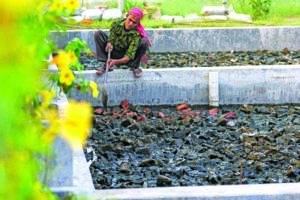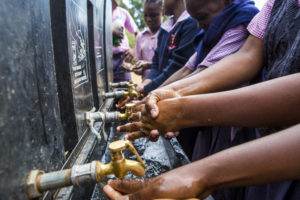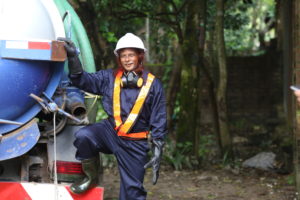It’s a shituation!
Do you have a working toilet at home? Is it connected to a sewer or septic tank? Do you feel safe when you use it? Are the streets in your neighbourhood free from human waste? Can you find a toilet when you’re out and about  in town and need to go?
in town and need to go?
Strange questions perhaps, but if you answered yes to all of these consider yourself lucky. Half the world’s population would have answered no to every one!
Despite being a basic human right, 4.2 billion people live without safely managed sanitation. 673 million people still practice open defecation and three billion people don’t even the facilities to wash their hands.
Untreated human waste is spreading into water supplies and the food chain for billions of people. Inadequate sanitation is estimated to cause 432,000 diarrhoeal deaths every year. Beyond the community, the lack of effective waste disposal or sewerage systems can contaminate ecosystems which in turn impacts on livelihoods and contributes to disease pandemics.
It’s a sanitation crisis.
Leaving no one behind
By international law we all have a human right to sanitation. Entitling everyone to safe, hygienic and secure sanitation services. Services that are socially and culturally acceptable, provide privacy and ensure dignity.
Urban populations are growing around the world, and inequalities and poverty mean slums are also growing, putting increasing strain on sanitation systems. Climate change is creating greater risks from either water scarcity or flooding.
But the needs of poor and marginalised people are often overlooked, and they frequently face discrimination based on their gender, race, caste, social status and so on. City slum dwellers are too often the ones left behind; living without adequate sanitation services and little opportunity to improve their situation. It’s going to take an innovative approach based on education, training and collaboration (as well as toilets) to meet the needs of everyone.

Shreeyanka Chowdhury from our India office.
Sanitising mind sets
In India huge progress has been made. But only 40% of the poorest people in urban areas have access to at least ‘basic’ sanitation – in simple terms, just a toilet or latrine to use. Finding a place to relieve yourself outside, often under the cover of darkness, leaves women and girls vulnerable to abuse and sexual assault.
In Choudwar, Odisha State India, a combination of better hygiene education and sanitation expertise is helping communities build a cleaner, safer city.
But building toilets is just part of the answer. Shreeyanka Chowdhury from our India office describes the complex societal issues that must be addressed to allow everyone access to a safe toilet, and ensure no one is left behind. Click the link below to listen.
Motivating change

In Kenya a powerful mix of improved access to sanitation and better hygiene education for mothers and caregivers, is helping protect children under five from the lifelong effects of diarrhoeal related illnesses.
James Ogutu, Senior Project Officer from our Kenya office, describes the importance of looking at the whole system to ensure everybody has access to sanitation and nobody is left behind.
“We have learnt overtime that efforts to modify human behaviour are complex, and can only be successful if built on a solid understanding of what motivates, facilitates and hinders adequate provision of water, hygiene and sanitation services.
We have established the institutional weaknesses and system vulnerabilities that limit effective provision of water, sanitation and hygiene services here in Kisumu County. Going forward, we shall be documenting the key financing aspects and sharing these with the county and national government teams.
In this way, we hope we shall be able to demonstrate to policy makers the need for sustainable, equitable and innovative sanitation services”.
 Unsung heroes
Unsung heroes
Informal sector pit emptiers are at the front line of improving sanitation access. These unsung heroes empty pits of human waste day after day but suffer terrible working conditions, health issues and social stigma.
It doesn’t have to be this way. In Faridur, Bangladesh, we’re helping pit emptiers to improve their working conditions, health, pay and status. Now working as recognised partners with the local authority, they’re providing an essential service for city residents. And putting pride into poo, and turning waste into wealth!
Here access to safely managed sanitation has increased from just 10%, to 43% and it’s continuing to improve. We’re part of a network of faecal sludge management experts, working together to extend city sanitation services that include the poorest across the entire country.
Toilets 4 All by 2030
A toilet is not just a toilet. It’s a life-saver, a dignity-protector and an opportunity maker. So this year on World Toilet Day, we challenge the idea that the poorest should have to live without one. And we’ll continue to put ingenuity to work to ensure no one is left behind without sanitation, and people in poverty can change a shituation into health, wealth and dignity!